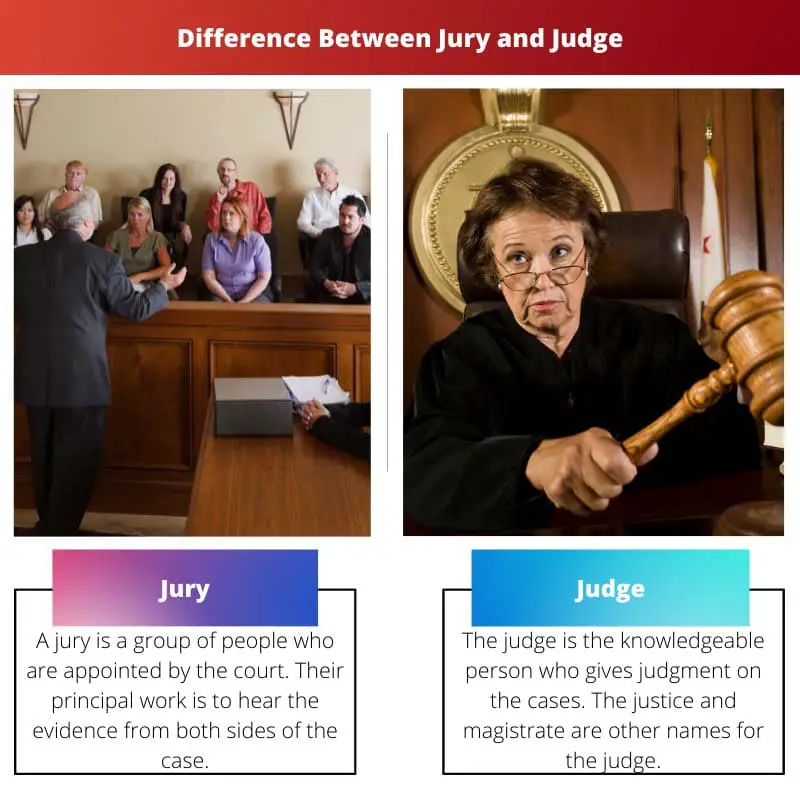The work of the jury and the judge look similar, but they are two different professions. A jury is a group of panels, and a judge is a single person. They both are for analyzing the problems. The jury and judge have distinct work on the case.
Key Takeaways
- A jury is a group of citizens selected to determine the facts of a case and render a verdict, while a judge is a legal professional responsible for overseeing the trial and ensuring due process.
- Jurors decide the outcome based on the evidence presented, whereas judges interpret the law, instruct the jury, and make rulings on legal issues.
- Jury trials involve the public’s participation in the judicial process, while bench trials, where a judge makes the decision, do not include a jury.
Jury vs Judge
A jury is a panel of 12 individuals who are randomly selected by the court. In the legal system, a jury collects evidence from the court and judges and decides whether a person is guilty or not. They follow the decisions of the judge. A judge is a single individual appointed by the government. They have the authority to listen and take over legal affairs brought into court. A judge is capable of pronouncing a sentence to jail or imposing a fine as the law prescribes.

A jury is a group of people who are appointed by the court. Their principal work is to hear the evidence from both sides of the case. The word jury is from the old French word juree. There are different types of juries available.
The jury system was developed in England during the mid-century. The jury system becomes the hallmark of the Anglo law system. The jury system is used in the United States, Britain and Canada.
The judge is the knowledgeable person who gives judgment on the cases. The justice and magistrate are other names for the judge.
A person must complete a university degree in law and have experience as a lawyer will be able to become a judge. A judge can also be a prosecutor and barrister. The judge aims to maintain justice and hold the law.
Comparison Table
| Parameters of comparison | Jury | Judge |
|---|---|---|
| Definition | A jury is a group of people | Judge is a single person. |
| Appointed by | The jury is appointed by the court | Judge is appointed by the government |
| Work | The jury can collect the evidence. | The judge gives the judgment on the cases. |
| Help | The jury always work with the judge | The judge does not work with the jury. |
| Origin of word | The word jury is originated from French word “juree” | The word judge is originated from the Latin word “judex”. |
What is Jury?
A jury is a group of people called jurors. They collected the evidence from the officials and submitted it to the court. In England, The jury system was first embedded.
They become a trademark for the Angle common law legal system. Still, many developed countries like Britain, Canada, and the United States follow the jury system. Some other countries’ laws are descended from the laws of England.
There are many types of juries. Petit jury or trial jury, Grand jury, and corner’s jury are common juries. A team of twelve people is called a petit jury or trial jury. The team that has more than twelve members is called the grand jury.
The corner jury is involved in the death cases. The criminal court jury also evolved in the Middle Ages of England. Their foremost work is to collect the proof and hear the evidence.
Normally, one must be qualified with the criteria to work as a jury. The jury is intended to reach the verdict quickly. The jury must know the language of the court, and they can be selected randomly from the court’s jurisdictional area.
The foreperson or presiding juror is the head of jurors. The judge selected the head of the jurors by the voting system. Enough numbers of a juror must appear in the case to make the verdict on time.

What is Judge?
A judge is a person. Either alone or a panel of judges have appeared for several important cases. The witness will tell their opinion to the judges. The judge will check the evidence presented by the solicitors.
He investigated on both sides with the evidence. Finally, the judgment is based on evidence, proof, and interpretation. A judge is expected to conduct the trial impartially and, typically, in an open court.
The judge has powers, discipline, and functions in jurisdictions. Sometimes, the power of the judge is shared with the jury. In some important cases, the judge is an examining magistrate.
The judge must proceed with the case with the law of government and orderly. The principal task of a judge is to settle the dispute between the two parties.
The judge has governmental power and has the power to raise questions against the government.
The judge has the power to order police, military, and judicial officials. The judgment is also appealed by proceeding to the higher court. The judge, prosecutor, and defence attorney are the three trained court officials.
Between legal systems, the role of the judge varies. In small cases, judges issue summary judgments without a jury. In family, criminal, and some important cases, they work as a panel.

Main Differences Between Jury and Judge
- A jury is a group of people, and a Judge is a single person.
- The jury is appointed by the court, and the Judge is appointed by the government.
- The jury can collect the evidence, and the judge gives the judgment on the cases.
- The jury takes help from the judge, and the judge does not take help from the jury.
- The word jury originated from the French word juree, and the word judge originated from the Latin word judex.

- https://heinonline.org/hol-cgi-bin/get_pdf.cgi?handle=hein.journals/clqv77§ion=73
- https://academic.oup.com/aler/article-abstract/3/1/125/159447

I appreciate how this article presents a comprehensive comparison between a jury and a judge. It helps in clarifying the distinct responsibilities of each role.
Agreed, it’s a highly enlightening read.
Definitely, this piece provides a well-structured and systematic breakdown of the differences.
I find this article to be quite thought-provoking, shedding light on the intricate aspects of the judicial system.
Absolutely, Lewis. It’s an intellectually stimulating piece.
Indeed, the depth of analysis is quite commendable.
The author’s approach to elucidating the comparison between a jury and a judge is commendable. It captures the complexity of these roles with clarity.
Absolutely, this article is a valuable resource for understanding the legal landscape.
Indeed, Stefan. It offers a thorough examination of the legal processes involved.
This comprehensive analysis of the roles of a jury and a judge is highly informative and engaging.
This article perfectly explains the key differences between a jury and a judge. It’s crucial for everyone to understand the nuances of these roles when it comes to the legal system.
Yes, it’s great to have such detailed information about the legal system’s inner workings.
Absolutely, Isobel. It’s insightful and informative.
This comparison is quite fascinating, and the article delves deeply into the distinctions between a jury and a judge.
I’m impressed by the depth of insight this article provides into the functions of a jury and a judge. It’s beneficial to have this level of understanding.
Indeed, Michael. This article is a testament to the author’s expertise in legal matters.